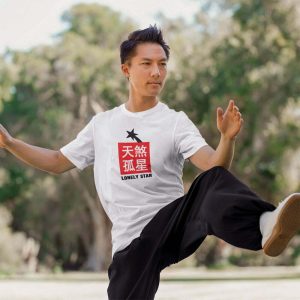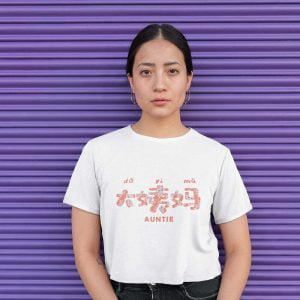What Does Action Only Really Mean in Singlish?
In the colourful world of Singlish, no phrase is quite as deliciously passive-aggressive or hilariously dismissive as Action only. If you’ve ever been tempted to clap back during a heated conversation or you’ve silently rolled your eyes at someone trying to show off — this phrase is for you.
-
Chinese, Graphic, KaoBeiKing, Quote, T-shirts, Typography, Valentines
Price range: $30.00 through $38.00 Select options This product has multiple variants. The options may be chosen on the product page
TL;DR Summary
- Action only is a classic Singlish phrase used to call out someone who talks big but doesn’t deliver.
- It’s used to defuse or flip the tone of Singaporean arguments, especially among friends or family.
- It originated from the unique way Singaporeans mix English with local cultural nuances.
- Great for throwing in some local humour when tempers rise — but tone matters!
- We explore its usage, history, and real-life examples below to help you master it like a true blue Ah Beng philosopher.
The Power of Action Only in Singlish
There’s Singlish that charms — like “lah” or “can can!” — and then there’s Singlish that slices, ever so slightly. Action only belongs to the second group. It’s sarcastic, dry, and carries that unmistakable Singaporean tone of: “Eh, don’t talk so much when you cannot do one.”
But unlike an outright insult, it’s cheeky. It slides into conversations, often met with laughter… or a defensive “Walao, I not like that, okay!” It signals hypocrisy, boastfulness, overconfidence — especially if someone talks big, but doesn’t live up to the hype.
For Singaporean millennials who grew up playing LAN games or fighting over who gets to chope seat at McDonald’s, Action only was a rite-of-puberty phrase. For Gen Z TikTok stars, it’s been reborn as a meme-worthy roast that perfectly captures unique Singaporean words in action.
Understanding the Origins of This Iconic Phrase
So where did Action only come from? While no linguistic archive can point to its exact year of birth, the roots lie in the way Singaporeans twist literal meanings in English to match local culture. “Action” here doesn’t just mean movement — it implies pretend bravado, empty gestures, or drama without substance.
-
hashtag, KaoBeiKing, Quote, Singlish/Hokkien, T-shirts, Typography
Price range: $30.00 through $38.00 Select options This product has multiple variants. The options may be chosen on the product page -
KaoBeiKing, Parody, Singlish/Hokkien, T-shirts, Typography
Price range: $30.00 through $38.00 Select options This product has multiple variants. The options may be chosen on the product page
In Hokkien, there’s a similar sentiment: “Act garang” (pretending to be fierce/brave). The English equivalent might be “all bark, no bite.” Over time, these sentiments morphed into the succinct Singlish phrase: Action only.
It’s grammatically incomplete, yet emotionally full. And that’s very Singlish — where incomplete syntax hides deep social intelligence and helps with resolving conflicts in the most Singaporean way possible.
How to Use Action Only in Everyday Conversations
You don’t need a PhD in Linguistics to use Action only. But knowing where to sprinkle this Singlish phrase is an art. Here’s how:
- Scenario 1: The Show-Off Friend
Friend: “This weekend I’m starting gym. Going every day one.”
You: “Action only lah. Last week you say same thing.” - Scenario 2: The Flexing Colleague
Colleague: “Wah, I can eat 10 chilli padi no problem leh.”
You: “Okay lor. Action only, later stomachache you cry.” - Scenario 3: Family Drama
Auntie: “I told Ah Kong liao, I not scared to scold him.”
Cousin whispers: “She always say only. Action only!”
Notice how each example taps into relatable Singaporean arguments — boast, challenge, gossip — and ends with that classic burn that feels more comedic than cruel. These everyday Singlish moments show how the phrase naturally fits into local conversations.
Resolving Conflicts Singaporean Style
Arguments in Singapore rarely go full-blown dramatic like in K-dramas or Western films. We’re more subtle, more sarcastic. And Action only plays into this cultural habit of de-escalation through humour, making it one of the most effective unique Singaporean words for resolving conflicts.
Here’s why it works:
- Non-confrontational tone: Instead of shouting match, it’s a half-teasing slapdown.
- Signals familiarity: You can only use it with people you’re close with or comfortable teasing.
- Shifts tension: From anger to awkward laughter.
Using this kind of Singlish phrase in a heated moment connects with uniquely Singaporean values — paiseh, don’t want to lose face, and the ultimate goal of saving harmony without saying sorry directly.
-
Chinese, Chinese New Year, KaoBeiKing, T-shirts, Typography, Women
Price range: $30.00 through $38.00 Select options This product has multiple variants. The options may be chosen on the product page
It’s basically resolving conflicts, kopi tiam version — efficient and effective.
Examples of Action Only in Real Life
If you’ve been around heartland conversations — on the MRT, at kopitiams, or even hawker centre aunties chatting — you’ve probably heard Action only delivered in many colourful ways during typical Singaporean arguments:
- In National Service: “Last time say want chiong all the way. Then come BMT, headache la, stomach pain la. Action only.”
- Among students: “He say he study whole night, but play Mobile Legends until 4am. Action only sia.”
- At weddings: “He propose so big one, flash mob and all… end up still not married leh. Action only!”
In each of these examples, tone is key. It’s typically deadpan, with subtle sarcasm — not to hurt, but to highlight a social truth. This makes it perfect for everyday Singlish conversations where you want to keep things light.
Mastering the Art of Action Only
Want to perfect this essential Singlish phrase? Here’s your mini-mastery guide for using one of the most versatile unique Singaporean words:
✔️ When to Use It
- With friends or folks you’re familiar with.
- When someone is bluffing, boasting, or being dramatic.
- To add humour during tense conversations and help with resolving conflicts.
⚠️ When NOT to Use It
- With people who don’t understand Singlish phrases well.
- In formal settings — unless your boss very steady and got sense of humour.
- When someone is genuinely upset — it can sound dismissive if misused.
Remember, Singlish is more than just language — it’s about relationships. Action only works best when there’s trust. Use it right, and you’ll diffuse Singaporean arguments like a hawker centre Yoda. Use it wrong, and you might kena block on Instagram.
Final Thought
Action only is more than a throwaway insult. It’s a uniquely Singaporean way of keeping it real. Beneath its sarcasm is care — to call someone out, yet save them from embarrassment. It’s efficient, it’s cheeky, and it always, always lands with a laugh (most of the time lah).
Whether you’re settling petty quarrels, roasting your friends, or teaching your ang moh partner about unique Singaporean words, one thing stays true: Action only gets the job done — no yelling, just feeling. Master this Singlish phrase, and you’ll navigate everyday Singlish conversations like a true local.
Frequently Asked Questions
- What does Action only in Singlish mean?
It refers to someone who talks big or acts like they’ll do something — but doesn’t follow through. Basically, all talk no action. - Can Action only be considered rude?
Depends on tone and context. Among friends, it’s usually cheeky. With strangers or in serious situations, it might offend. - Is Action only only used in Singapore?
Yes, it’s uniquely Singlish. Malaysia has similar expressions, but Action only as phrased is from Singapore. - How do I say Action only with the right tone?
Use a half-sarcastic, teasing tone. It’s a roast but a gentle one. Think amused, not angry. - What’s the difference between Action only and Talk only?
“Talk only” is more direct. Action only has a layer of sarcasm and sounds slightly more playful. - Can I use Action only in a professional setting?
Better not — unless your workplace is super chill. Stick to casual settings like lunch breaks or Zoom chats with close colleagues. - Does using Action only help in resolving arguments?
Yes — in Singaporean-style arguments where humour and saving face matter, it can lighten tension and restore good vibes.








